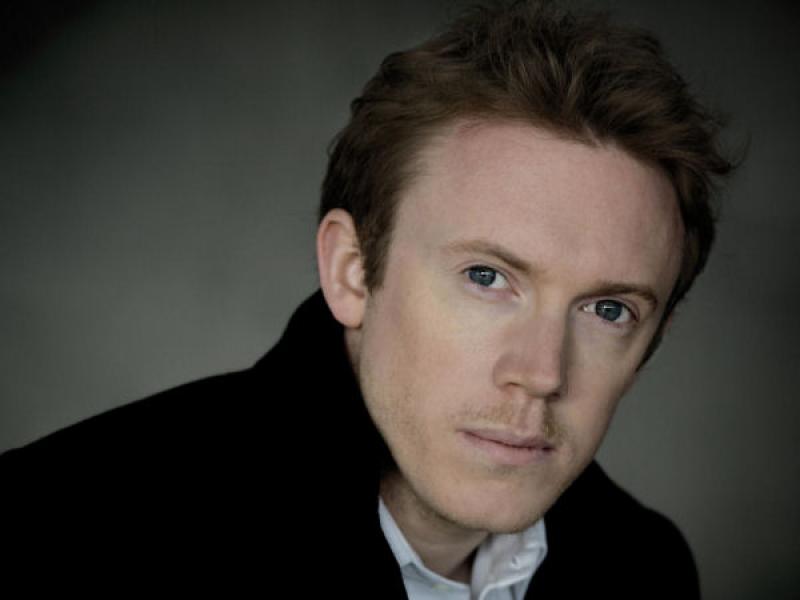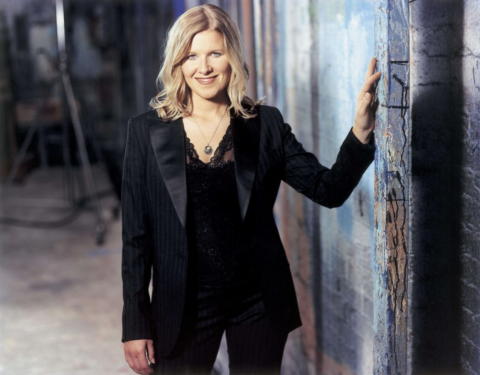Tetzlaff, LSO, Harding, Barbican | reviews, news & interviews
Tetzlaff, LSO, Harding, Barbican
Tetzlaff, LSO, Harding, Barbican
Ecstatic Beethoven dragged back to earth by some workaday Brahms

With Kavakos, Faust, Shaham and Skride already been and gone, and Jansen, Ehnes, Bell and Ibragimova still to come, the LSO’s International Violin Festival has nothing left to prove. We’re not short of star power in London’s concert scene, but even by our spoilt metropolitan standards this is a pretty unarguable line-up. With excellence a given, then, it takes quite a lot to startle a crowd into delight – especially on a Sunday night.
Ever thoughtful, Tetzlaff has taken the cadenzas that Beethoven wrote when he arranged the concerto for piano and reworked them himself for violin (with a little help from the timpanist). He performed these at the Proms in 2012 with the St Louis Symphony, where they didn’t quite fit into the architecture of the piece as a whole, but here, accompanied by Daniel Harding and the LSO, they suddenly snapped into focus – witty, and certainly less even, less secure in mood than their surrounding landscape, making a clever juxtaposition.
Tetzlaff played up to an LSO wound to almost Brucknerian intensity by Harding
Tetzlaff has always been a superb player, but is increasingly an equally fine performer. Where once his absolute technical assurance could render things a little rigid, he now finds a quasi-spontaneity (the kind that only comes beyond complete familiarity with the musical terrain) that is matched by new physical liberation. His is a combination of formality and freshess perfectly suited to the Beethoven concerto, with its undemonstrative, sunny moods.
Playing up to an LSO wound to almost Brucknerian intensity by Harding, Tetzlaff had no trouble finding the drama in the opening Allegro, setting this into relief with the exquisite simplicity of his opening to the Larghetto – a pianissimo that should have been risky, edgy, but was just immaculate certainty. It was only in the final Rondo that disagreement emerged, with Tetzlaff keeping this dance carefully confined to the salon – all elegance and poise – while Harding’s orchestra insisted on a rather more rustic, outdoorsy approach.
 A lovely piece of programming set the Beethoven concerto alongside Brahms’s German Requiem. Unfortunately, however, after the ecstatic musicianship of the Beethoven the London Symphony Chorus’s Brahms couldn’t offer the cathartic peace we needed, delivering a performance whose uncertainties and anxieties greatly outweighed its achievements. Which is a shame, because around them soloists Sally Matthews (pictured above) and Matthias Goerne and the LSO were fashioning a bold and rather exciting performance, set apart by the exploratory brilliance of Goerne and the depth of colour and textural intricacy of wind and brass.
A lovely piece of programming set the Beethoven concerto alongside Brahms’s German Requiem. Unfortunately, however, after the ecstatic musicianship of the Beethoven the London Symphony Chorus’s Brahms couldn’t offer the cathartic peace we needed, delivering a performance whose uncertainties and anxieties greatly outweighed its achievements. Which is a shame, because around them soloists Sally Matthews (pictured above) and Matthias Goerne and the LSO were fashioning a bold and rather exciting performance, set apart by the exploratory brilliance of Goerne and the depth of colour and textural intricacy of wind and brass.
Unfortunately, despite being obviously well prepared and sensitive to musical detail (with the peerless Simon Halsey responsible you’d expect no less), the chorus were so underpowered and timid as to make no headway into the thick LSO sound. There’s the world of difference between an electric, spun pianissimo, charged with energy and muscularity, and a breathy, fearful one. Here we had the latter, opening with a “Selig sind” both flat and unsupported, setting the tone for all to come; even at the work’s loudest climaxes the sound still lacked a core, and fugal passages only exposed the singers further.
Walking home, however, what stayed in the ears was not the workaday Brahms but the Beethoven, a generous and thrilling bit of music-making not just from Tetzlaff but also the LSO, galvanised into Rattle-level intensity and eagerness by Harding and their soloist. Ehnes, Bell, Jansen and Ibragimova have their work cut out.
- The LSO International Violin Festival runs until 28 June 2015
rating
Explore topics
Share this article
Add comment
The future of Arts Journalism
You can stop theartsdesk.com closing!
We urgently need financing to survive. Our fundraising drive has thus far raised £49,000 but we need to reach £100,000 or we will be forced to close. Please contribute here: https://gofund.me/c3f6033d
And if you can forward this information to anyone who might assist, we’d be grateful.

Subscribe to theartsdesk.com
Thank you for continuing to read our work on theartsdesk.com. For unlimited access to every article in its entirety, including our archive of more than 15,000 pieces, we're asking for £5 per month or £40 per year. We feel it's a very good deal, and hope you do too.
To take a subscription now simply click here.
And if you're looking for that extra gift for a friend or family member, why not treat them to a theartsdesk.com gift subscription?
more Classical music
 Bizet in 150th anniversary year: rich and rare French offerings from Palazzetto Bru Zane
Specialists in French romantic music unveil a treasure trove both live and on disc
Bizet in 150th anniversary year: rich and rare French offerings from Palazzetto Bru Zane
Specialists in French romantic music unveil a treasure trove both live and on disc
 Scottish Chamber Orchestra, Ibragimova, Queen’s Hall, Edinburgh review - rarities, novelties and drumrolls
A pity the SCO didn't pick a better showcase for a shining guest artist
Scottish Chamber Orchestra, Ibragimova, Queen’s Hall, Edinburgh review - rarities, novelties and drumrolls
A pity the SCO didn't pick a better showcase for a shining guest artist
 Kilsby, Parkes, Sinfonia of London, Wilson, Barbican review - string things zing and sing in expert hands
British masterpieces for strings plus other-worldly tenor and horn - and a muscular rarity
Kilsby, Parkes, Sinfonia of London, Wilson, Barbican review - string things zing and sing in expert hands
British masterpieces for strings plus other-worldly tenor and horn - and a muscular rarity
 From Historical to Hip-Hop, Classically Black Music Festival, Kings Place review - a cluster of impressive stars for the future
From quasi-Mozartian elegance to the gritty humour of a kitchen inspection
From Historical to Hip-Hop, Classically Black Music Festival, Kings Place review - a cluster of impressive stars for the future
From quasi-Mozartian elegance to the gritty humour of a kitchen inspection
 Shibe, LSO, Adès, Barbican review - gaudy and glorious new music alongside serene Sibelius
Adès’s passion makes persuasive case for the music he loves, both new and old
Shibe, LSO, Adès, Barbican review - gaudy and glorious new music alongside serene Sibelius
Adès’s passion makes persuasive case for the music he loves, both new and old
 Anja Mittermüller, Richard Fu, Wigmore Hall review - a glorious hall debut
The Austrian mezzo shines - at the age of 22
Anja Mittermüller, Richard Fu, Wigmore Hall review - a glorious hall debut
The Austrian mezzo shines - at the age of 22
 First Person: clarinettist Oliver Pashley on the new horizons of The Hermes Experiment's latest album
Compositions by members of this unusual quartet feature for the first time
First Person: clarinettist Oliver Pashley on the new horizons of The Hermes Experiment's latest album
Compositions by members of this unusual quartet feature for the first time
 Gesualdo Passione, Les Arts Florissants, Amala Dior Company, Barbican review - inspired collaboration excavates the music's humanity
At times it was like watching an anarchic religious procession
Gesualdo Passione, Les Arts Florissants, Amala Dior Company, Barbican review - inspired collaboration excavates the music's humanity
At times it was like watching an anarchic religious procession
 Classical CDs: Camels, concrete and cabaret
An influential American composer's 90th birthday box, plus British piano concertos and a father-and-son duo
Classical CDs: Camels, concrete and cabaret
An influential American composer's 90th birthday box, plus British piano concertos and a father-and-son duo
 Cockerham, Manchester Camerata, Sheen, Martin Harris Centre, Manchester review - re-enacting the dawn of modernism
Two UK premieres added to three miniatures from a seminal event of January 1914
Cockerham, Manchester Camerata, Sheen, Martin Harris Centre, Manchester review - re-enacting the dawn of modernism
Two UK premieres added to three miniatures from a seminal event of January 1914
 Kempf, Brno Philharmonic, Davies, Bridgewater Hall, Manchester review - European tradition meets American jazz
Bouncing Czechs enjoy their Gershwin and Brubeck alongside Janáček and Dvořák
Kempf, Brno Philharmonic, Davies, Bridgewater Hall, Manchester review - European tradition meets American jazz
Bouncing Czechs enjoy their Gershwin and Brubeck alongside Janáček and Dvořák
 Solomon, OAE, Butt, QEH review - daft Biblical whitewashing with great choruses
Even a top soprano and mezzo can’t make this Handel paean wholly convincing
Solomon, OAE, Butt, QEH review - daft Biblical whitewashing with great choruses
Even a top soprano and mezzo can’t make this Handel paean wholly convincing

Comments
Workaday? Underpowered?
I wish to disagree most
Ditto. Brahms was magnificent
I tend to agree with the
Interesting that the Guardian
But it seems, to my sorrow,